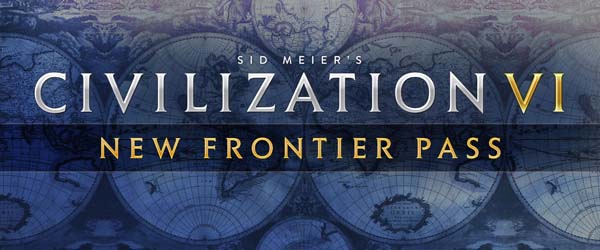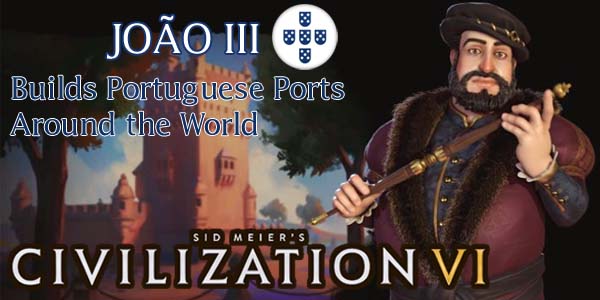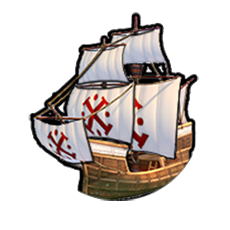
Firaxis has released the final "New Frontiers" update for Civilization VI. This update from March 2021 includes the new civilization Portugal, lead by João III.
If Firaxis decides to launch a second "New Frontiers" season, I will continue to write guides for the new civilizations and leaders. I will also put up polls on Patreon to let my Patrons decide which civ or leader to cover first (if Firaxis gives enough advance notice).

If "New Fontiers" is the end of the life cycle of Civilization VI, then don't fret. If I get enough interest from my Patrons, I'll also write guides for the "New Frontiers" game modes, or go back and create / update guides for legacy leaders. We also have new games such as Old World and Humankind coming out. I'll be playign both games when they release on Steam, and can also write guides for those games, if my supporters ask for it.
Portugal rose to prominence during the "Age of Discovery" in the 15th and 16th centuries, exploring the world and becoming the first global maritime empire. It established colonies and/or outposts in Brazil, Africa, India, and east Asia, it monopolized the spice trade, and was responsible for the formalization of the division of the globe into hemispheres. Portugal's dominion was short-lived however. A devastating earthquake in Lisbon in 1755, followed by occupation by Napoleonic France, and the eventual independence of Brazil combined to collapse the Portuguese maritime empire.
Portugal's maritime empire was laregely secured by King João III "The Pious" during his reign in the first half of the 16th century. João III established the first European colonies in Brazil and began importing Brazilwood into Europe, which was popular for creating red dyes. He was considered a scholar, humanist, and diplomat who supported the arts, granted scholarships to foreign universities, and remained neutral in wars between other European powers. But history is never so black-and-white, and João III is no exception. He also imported South American slaves into Europe from Brazil, and he boosted Portugal's relationship with the Vatican by allowing the Inquisition to establish itself in Portugal.
DISCLAIMER:
Civilization VI is still a "living game". Strategies for the game (and for specific leaders and civs) may change as Firaxis applies balance patches, introduces new features, or expands the game through further DLC or expansion packs, or as the Civ community discovers new strategies or exploits. As such, the following strategy guide may change from time to time. I will try to keep it up-to-date, and will make notations whenever changes are made. I'll also post links in the official 2K forums and CivFanatics, where I'll also report any changes made. If possible and practical, I will try to retain the original content of the strategy for posterity.
I welcome any feedback or suggestions that readers wish to offer. Feel free to post on the linked forums, or by posting a comment at the bottom of the page.
This guide is up to date as of the release of the [final] "New Frontiers" April 2021 Update (ver. 1.0.12.9)
João III explores the map to meet all other civilizations and city states, and will seek to establish peaceful trade relations with all of them, including constructing trade infrastructure in those other civilizations' cities.

João III of Portugal's uniques in Civilization VI

Portuguese capital start bias: coast.
Portuguese civilization unique: Casa da Índia
"International Trade Routes can only reach cities on the coast or with a Harbor, but receive +50% towards all yields. Trader units have +50% range over water, and can embark as soon as they are unlocked."
The power of Portugal to utilize its unique ability is largely out of Portugal's hands, as it requires other civilizations to have cities with ocean access. Basically, Portuguese trade routes can only travel to foreign cities that have ocean access. I haven't found a way yet to force a trade route to reach a foreign city over land. Based on my testing, it also appears that foreign cities with a harbor on a lake do not permit Portugal to send a trade route -- even if the source Portuguese city and the destination foreign city have a harbor on the same lake! How many foreign cities are eligible to receive Portuguese trade routes will depend largely on the type of map and the civilizations present (and their own respective start biases). Portugal should have multiple possible trade destinations in most continents and archipelago maps, but may have very limited access to foreign trade on pangea map types. Completely land-locked maps will eliminate Portugal's ability to send foreign trade entirely.
Foreign cities with harbors on lakes cannot receive Portuguese trade routes.
The trade routes that Portugal is able to send to foreign cities, however, will be highly profitable. They will generate 50% more of all yields. Traders also have 50% greater range over water, which will help them reach cities further away, if there are not any nearby coastal cities. The extended range is especially helpful prior to researching Cartography, at which time Traders may have to navigate around snaky land features. The extended range will also help Portuguese traders cross oceans on larger continental maps.
Portugal can still send trade routes between its own cities as normal, including over land. If you do not have valid foreign coastal cities to send trade routes, then you can use policies like Caravansaries or Triangular Trade to generate at least some wealth from internal routes.
João III's leader unique: Porta do Cerco
"All units receive +1 Sight. +1 Trade Route capacity when a new civilization is met. Open borders with all city states."

Each time João makes first contact with another major civilization, his trade route capacity will increase by 1. You do not automatically receive the Trader unit; the Trader itself will still need to be trained in a city. João does not get increased trade routes for meeting city states, free cities, or (obviously) barbarians.
All of João's units receive +1 sight to help them find new civilizations. This includes land, naval, religious, civilian, and air units. João's units will be much better at exploring and at reconnoitering neutral and enemy lands. This extra visibility can also allow João to station units in neutral lands near Portuguese borders in order to prevent new barbarian outposts from spawning nearby.
Finally, João automatically gains open borders with all city states. This will allow João to move military units through city state territory without needing to invest large amounts of envoys into the city state. It also allows João to use his own units to block rival civs from surrounding and conquering city states who are not João's suzerain [yet]. Free open borders with city states also ensures that so long as city states exist on the map (on the coasts), João always has potential destinations to build Feitorias.
Unique building: Navigation School
Game Info:
"A building unique to Portugal. +25% Production towards naval units in this city. +1 Science for every two coast or lake tiles in this city. +1 Great Admiral points."

Requirements: Education technology,
must be built within a Campus district with a Library.
Replaces: University.
Cost: 250 Production. | 1000 Gold | [??] Faith
Maintenance Cost: 2 gold per turn (standard game speed).
Effects:
+4 Science, +1 Housing, +1 citizen slot, +1 Great Scientist point per turn,
+1 Science for every 2 coast or lake tile worked by the city,
+25% Production towards naval units trained in the city,
+1 Great Admiral point per turn.
The Navigation School provides all of the benefits of a normal University, but with the addition of several benefits that you might expect from an advanced Harbor building. It grants extra science from coast and lake tiles, as well as a production boost towards training naval units within the city. It even provides a Great Admiral point, which will help give Portugal priority access to renaissance and later admirals. Because of these naval bonuses, Portugal will likely want to construct Campuses in coastal cities or cities with a Harbor so that the Harbor and Navigation School bonuses will stack to give Portugal very powerful naval industry and research. It also stacks nicely with the extra science provided to water resources by the Water Park's Aquarium building.
Cities with a Navigation School, Seaport, and Aquarium will have very high-yield water tiles.
Note that the extra science from water tiles is not represented as yield on the tile! It is given directly to the Navigation School building. This means that you do not need to have enough population to work those water tiles. The Navigation School is also the same cost to build and maintain as the regular University, so no need to limit campuses and Navigation Schools to cities with access to the sea. Even without access to water, a Navigation School in a land-locked city operates exactly as a normal University would, except that it also provides the extra Great Admiral point.

Unique unit: Nau
Game Info: "Portuguese unique naval melee unit that replaces the Caravel. Starts with 1 free Promotion and is less maintenance. Has two charges to build Feitorias."

Requirements: Cartography technology
Replaces: Caravel.
Obsoleted: Steam Power technology.
Upgrades to: Ironclad.
Cost: 240 Production | 960 Gold | ?? Faith [standard speed].
Maintenance Cost: 2 Gold per turn [standard speed] (-2 from Caravel).
Promotion Class: naval melee,
Attack Type: melee,
Melee Strength: 55,
Movement Speed: 4.
Bonuses:
+1 Sight,
Starts with 1 free promotion,
Has 2 build charges to construct Feitorias.
The Nau has the same cost, movement speed, and combat strength as the Caravel that it replaces, however, it is half the cost to maintain. It also starts with a free promotion when trained in a city or upgraded from a Galley. This can be used to take the Helmsman promotion, which increases the Nau's speed and allows it to more quickly reach destinations for placing a Feitoria.
The Nau is not intended to be a combat unit, so it's true strength is in its ability to construct up to 2 Feitoria improvements (see below) in other civs' territory. As long as the Nau has at least 1 charge remaining, it can also be used to repair pillaged improvements, remove existing improvements, or clear nuclear fallout. This can help reduce Portugal's reliance on Builders to repair improvements damaged by hurricanes, rampaging barbarian pirates, or enemy naval units.
Unique improvement: Feitoria
Game Info: "Unlocks the Nau ability to construct a Feitoria, unique to Portugal.
Provides +4 Gold and +1 Production. Trade routes sent to this city from Portugal gain +4 Gold and +1 Production. Can only be built adjacent to Luxury or Bonus resources in territory belonging to other Civilizations or City-States that you have Open Borders with. Must be built on a Coast or Lake tile adjacent to land and not adjacent to another Feitoria. Feitorias cannot be removed."

Requirements:
must be built by Nau on coastal water tile
within the borders of another civilization or city state
with which you have open borders,
must be adjacent to a luxury or bonus resource,
may not be built adjacent to another Feitoria.
Effects:
+1 Production and +4 Gold on the tile,
Portuguese trade routes to this city provide +1 Production and +4 Gold to Portugal,
cannot be removed.
Portuguese Nau units build Feitorias in foreign territory, which grants the tile yields to the foreign city that works that tile. In return, Portugal receives the same yields back if Portugal sends a trade route to that city. This has several important implications:
- Only build Feitorias near cities belonging to civilizations who you have relatively peaceful relations with, and with whom you intend to send trade routes. Otherwise, you are only giving free yields to a rival.
- Do not build Feitorias on tiles owned by cities that do not have ocean access. This will only give free yields to a rival, since you won't be able to send a route to that city.
If you're not above trolling an opponent, there is one possible exception to the above rules. Since Feitorias cannot be removed (except by capturing the city that owns the Feitoria's tile), Portugal can use Feitorias to block the other player from building potentially more valuable water infrastructure such as districts and wonders. For example, a well-placed Feitoria near an off-coast rival city could potentially prevent that city from building a Harbor. This can lock the other city out from sending ocean-going trade routes from that city, and can block that city from ever producing naval units. Deviously-placed Feitorias can also potentially block the placement of offshore wonders such as the Venetian Arsenal, Statue of Liberty, or Sydney Opera House. It can also block the placement of offshore wind farms, limiting the amount of power that a coastal city can receive in the late-game.
Also, those rules don't necessarily apply to city states, since they aren't competing to win the game. Feel free to build multiple Feitorias in city state waters, especially if you are the suzerain of those city states, even if you aren't sending trade routes to them. This will grant extra yield to those city states, which could go towards training military units that may support you in any current or future war efforts. It can also help those city states build more districts and buildings, which can increase the yield that you receive from trade routes sent to them.
You may want a Feitoria in a foreign city, but there may not be a legal water tile on which to place one.
You can also send multiple trade routes (from different Portuguese cities) to the same foreign city with a Feitoria. This will allow you to double-dip on the trade route bonus while only granting the standard yields back to the foreign city. Hypothetically, you can build multiple Feitorias in one single foreign city with high gold yields (the effects of multiple Feitorias will stack), and then send all of your trade routes to that one city. The longer range of Portuguese trade routes will make this more viable. In actual practice, however, you will likely want multiple Feitorias built in multiple foreign cities across the globe (er... "cylinder"?) so that all of your cities will have a profitable Feitoria-boosted trade route within range.
Note that your ability to construct Feitorias will be limited by the borders growth of other civilizations, which is something outside of Portugal's control. If other civilizations don't have water tiles within their borders, Portugal will be prevented from building Feitorias. By sending envoys to city states, you can cause them to annex new tiles, but you can't control which tile will be annexed. Since water tiles have low priority (unless they have a resource), many cities near the ocean may not have valid tiles on which to build Feitorias.
A few extra elements of book-keeping: Feitorias can be built outside the workable radius of a foreign city, but building a Feitoria in such a location will have no effect on trade routes to the city that owns the tile (remember, cities can annex tiles outside the 3-tile range, and such tiles still belong to the city that annexed it). Lastly, if a city is captured by any faction (including by Portugal) any Feitoria in the city's borders are deleted. Portugal cannot re-capture its own Feitorias to take advantage of their tile yields.
Dominating ocean trade: strategy for João III of Portugal
Portugal will want to start exploring far and wide right out of the gate. Your starting Warrior (and even the Settler) will have extra visibility to reveal more tiles around your starting location. You can use this benefit to potentially find a better place to settle than the tile that your Settler spawns on. Just don't spend too long wandering around with your Settler; you aren't Kupe! Your first build in your capital should probably be a Scout, and you'll likely also want to train another Scout or two as early as is practical. Make sure you still build a Warrior and/or Slinger to defend yourself from barbarians.
Your starting Warrior (and Scouts will have extra visibility to find tribal villages, wonders, and other civs.
In addition to searching for tribal villages, wonders, and the general lay of the land, Portuguese Scouts will also be looking for other civilizations. Each new civilization you meet will increase your trade route capacity by 1, and hopefully you'll be able to meet them all before any are removed from the game by other warmongers. Send your Scouts out in different directions to maximize your chances of encountering multiple civilizations. You'll also want to build one or more Galleys relatively early. Use those Galleys to reveal water routes to your neighbors' cities, and also to defend your sea-faring Traders from barbarian plunder.
With the extra trade route capacity and limited foreign destinations to send them, you'll likely have a few routes to spare. You can use these as domestic trade routes between your own cities to help them grow quicker and be more productive. Domestic routes can travel between land-locked cities as normal. Land-locked Portuguese cities can also send international trade routes, as long as the destination city is on the coast or has a Harbor. So don't shy away too much from expanding inland. Coastal cities will be preferable, but inland cities will still be perfectly viable for Portugal.
Portugal can send domestic trade routes between its land-locked cities.
If playing with the "Barbarian Clans" game mode, it might be advantageous to protect nearby coastal barbarian outposts and allow it to grow into a city state. This will give you a potential extra trade destination and a place to build your Feitorias later in the game.

Since all of your international trade routes will be going over the seas, it is important to protect them from pirates and rival naval units. Build your own navy to protect your Traders, and take advantage of the increased sight range of your naval units to detect and neutralize pirates before they can plunder your trade ships. The Nau is not any more potent in combat than the regular Caravel, so you will also want to have Frigates and/or Privateers stationed along your trade routes to defend your trade units. The Mogadishu city state suzerain bonus is also very valuable for Portugal, as it makes your embarked traders immune to being plundered.
Since Trade routes generate additional yields beyond just gold (especially with alliances in play), it behooves Portugal to send trade routes from as many of their cities as possible. Don't just use the same starting city for all your trade routes. Spreading your trade routes out between your cities will grant valuable production to your less-productive cities, which can help them build the infrastructure that will make them more productive long-term.
When you unlock your unique Nau unit, train or upgrade one as soon as possible and send it immediately to your most loyal trade partner (preferably someone with an active alliance). Build a Feitoria in the most profitable city(ies) of that civ, starting with the cities to which you are already sending trade routes. Definitely create one or more Feitorias in the city with the highest gold yield. Also consider placing Feitorias in cities that have lower gold yield, but high production (from the presence of Industrial Hubs, Dams, and so forth). Such cities will be great destinations for your younger cities, since the food and production provided to your city by the trade route will help that city get its key infrastructure built sooner (while still providing a decent sum of gold).
Prioritize building Feitorias in allied cities that you are already sending trade routes to.
I recommend prioritizing building Feitorias in:
- allied cities that you are already sending trade routes to,
- suzerain city states with profitable trade routes,
- friendly cities that you are already sending trade routes to,
- civilizations who you are not currently trading with, but with whom you would like to improve diplomatic relations by sending trade routes in the future,
- other city states.
Do not build Feitorias in cities belonging to rival powers who are hostile towards you, or to whom you never intend to send trade routes (either because you don't trust them, or because their cities aren't very profitable destinations). Also do not build a Feitoria in a city that does not have ocean access, since you'll only be giving extra yield to that city and won't be able to send a trade route.
You can sell all your coal to an ally and then
buy new obsoleted Nau if you need more Feitorias.
Prior to teching to Steam Power, make sure that you have already constructed all the Feitorias that you likely plan to build, or have enough charges left on your existing Nau to build enough Feitorias. Steam Power will unlock Ironclads and obsolete the Nau, which can lock you out of training new Nau in order to construct more Feitorias. If you find that you need a new Nau in order to construct a Feitoria, you can try selling all your coal to a loyal friend or ally (someone who won't turn around and use that coal against you). Having 0 coal in your stockpile will lock you out of training Ironclads and will allow you to train Nau again. Use gold to buy the Nau while your coal reserve is at 0. If you have coal mines, rolling over the turn will cause your coal reserves to increase, which will convert any Nau in your build queues into Ironclads; thus, gold-purchasing the Nau on the turn that you sell all your coal is the only sure-fire way to get more Nau.
What to do if there are no possible trade routes?
If you do end up playing a map in which there simply aren't any possible international trade routes for Portugal (either no other civs built cities on the coast, or the few that did are hostile towards you), you can still utilize Portugal's abilities. You'll be able to send trade routes between your own cities without restriction. Using policies like Caravansaries / Triangular Trade will generate some wealth out of those routes. It won't be nearly as much as international trade, but it will keep your economy afloat.
In the meantime, you'll still have more trade routes traveling between your cities compared to other civs, and they'll be providing lots of extra food and production. You won't be gold-guying as much, but you'll still be able to more quickly construct key infrastructure, train units, and build wonders. The Collectivization policy can also help further buff those yields when you're making a late-game push for victory. Your high population cities will also be able to get earlier benefits out of policies like Free Market or Rationalism, as well as from Governor Reyna's Tax Collector promotion.
With larger population cities, you will have to worry more about Amenity. Build Entertainment Complexes earlier, be sure to settle near lots of distinct luxury resources, trade for any luxuries you don't have, and use policies like Liberalism to keep your cities from becoming displeased.
More than just a peaceful trade empire
Portugal's abilities specialize it towards trade and wealth generation. Gold is perhaps the single most versatile tool for achieving any victory type in the game, and Portugal will likely have lots of gold at its disposal.
Portugal's wealth can be leveraged towards any victory condition.
The trade focus makes João a good candidate for peaceful turtle strategies. Maintaining peaceful trade and alliances with other civilizations and city states will generate Diplomatic Favor, which can be applied towards the World Congress and used to vote on yourself for a Diplomatic Victory. Having huge gold income will allow Portugal to buy much of its units and city infrastructure, which will also free those cities up to run projects for scored competitions such as the World's Fair or Nobel Prize, which grant additional diplomatic victory points. Cities can also spend their production towards Carbon Recapture projects to accumulate extra Diplomatic Favor to spend on late-game congress resolutions.
Cities that construct most of their infrastructure through gold purchase will also be free to run specialty district projects to contribute towards Culture Victory and Science Victory. Running Theater Square Performances will gain more Writers, Artists, and Musicians for Portugal to create more Great Works, and Portugal can use its gold reserves to buy the buildings necessary to house those works. Portugal can also spend its cities' production on culture wonders, such as Sydney Opera House and Hermitage, and construct the National History Museum in your Government Plaza.
Having lots of coastal cities and using gold to purchase Navigation Schools in your Campuses and Aquariums in your Water Parks will generate a lot of bonus science on your water tiles. Portugal will also get extra science yield from trade routes if you send routes to foreign cities that have Campus districts, or which belong to a civilization that you have a Research Alliance with. All this extra science will speed Portugal's progress through the tech tree and the Science Victory.
Again, having lots of extra gold for buying units and buildings will free up cities to produce Spaceports and space race projects. The gold can also be spent to purchase engineers and scientists who can boost or rush the production of space race projects.
Peaceful trade can generate lots of Diplomatic Favor for passing favorable World Congress resolutions.
If Portugal is looking to dominate the world through a Religious Victory, it can similarly use its trade routes to spread religious pressure to foreign cities. Use gold to buy Holy Site buildings, then run the Holy Site Prayers project to boost the religious pressure that the Holy Site generates.
Portugal can also dominate the world through military might. Peace and diplomacy be damned! You can focus on using your military to protect your suzerain city states and then send all your trade routes to those city states. You can then spend all that gold to build and maintain a powerful military that can sweep across the globe for a Domination Victory. No need to maintain peace with any rival major civs at all.
Portugal can even use its large surplus of gold to employ a strategy similar to Hungary: maintain a small standing military in order to bait attacks from rivals, then buy units and levy city states to push back the aggressor and counter-attack. This can potentially reduce the grievances you generate and help maintain peaceful relations with your trade partners, while still allowing you to fight your enemies. It's risky, but it can work.
Shutting down Portugal's ports: playing against João III of Portugal
João III's A.I. agenda: Navigator's Legacy
"Focuses on exploring as much of the map as possible, and likes those who do the same. Dislikes civilizations that shun exploration."
An A.I.-controlled João will likely tend to peacefully trade with his neighbors. He'll likely always have gold on hand for trade deals, if you ever want to sell resources or great works. He'll be especially friendly towards you if you thoroughly explore as much of the world as possible, as quickly as possible. If you want to get on João's good side, then use recon units and naval units (Galleys and Caravels) to reveal as much of the map as possible. Preventing João from exploring by blocking his units from moving through your territory can limit his ability to explore. If you do this without provoking him into conflict, you will likely limit his ability to explore the map, which will help you to reveal more of the map than him, which will likely make him friendlier toward you.
João can be a valuable trade partner, but remember that he will likely have more trade routes available than you will, and those routes will generate more yield for João. He'll be reaping asymmetrical benefits from trade relationships and alliances. If João is in a strong position, then open trade will likely only make him disproportionately stronger. On the other hand, if Portugal is behind in tech, civics, and or military might, then it can be worthwhile to establish an alliance with João.
Trade can also be asymmetrical in the other direction. If your cities are not on the coast, or don't have harbors, then João simply won't be able to send trade routes to you. But you'll be able to send trade routes to him! Giving open borders will also allow him to build Feitorias on your water tiles. A human-controlled Portugal is unlikely to build a Feitoria in a city that they cannot send a trade route to, but the CPU may not be as smart with Feitoria-placement. If a João A.I. (or in-experienced human player) builds Feitorias in the borders of cities that are not directly on the coast or have a harbor, those Feitorias will provide your city with bonus yields without ever providing any benefit to Portugal.
Figure 1: Trade route to Antioch, which has Feitoria, generates 1.5 production and 24 gold.
If there is overlap between the workable radii of your cities, it is also possible (under certain circumstances) to limit the benefit that Portugal receives from its own Feitorias. If Portugal places a Feitoria on a tile that is workable by multiple cities, the owner of those cities can swap which tile works that Feirotia tile. Doing so also swaps which city "owns" the tile. If Portugal is sending a trade route to one city, but not the other, this can be used to nullify the yield bonuses that Portugal receives from that particular trade route. Furthermore, Portugal will be locked into that less profitable route for a number of turns.
Figure 2: Byzantine player swaps Feitoria tile to be worked by Adrianople.
In the example pictured, Portugal has built a Feitoria between the Byzantine cities of Antioch and Adrianople, and is sending a trade route to Antioch. The Feitoria tile is initially worked by Antioch, and provides an additional 1.5 production and 6 gold to the Portuguese trade route (see Figure 1). However, the Byzantium player can go to the Adrianople city management screen and swap the tile to be worked by Adrianople (Figure 2). This changes ownership of the Feitoria to Adrianople. Since the Portuguese trade route is no longer going to a city with a Feitoria, it loses the bonus production and gold (see Figure 3).
Figure 3: Antioch no longer owns a Feitoria; Portuguese trade route now provides only 18 gold and no production.
Be careful not to sleep on Portugal! Even though it is flavored to be a peaceful trade civilization, Portugal can be leveraged into a military powerhouse, especially at the hands of a human player. Having more trade routes that are also higher-yield will grant Portugal lots of money that can be used to purchase and maintain a large military on land, sea, and/or air. With enough gold income from trade to other civs or city states, Portugal can potentially buy new units faster than you can kill them, especially when defending Portuguese territory from invasion. Be sure to bring extra troops.
You will want to have a powerful navy in order to defeat Portugal's trade route escorts, then plunder the vulnerable traders on the open sea for large sums of money. If Portugal is suzerain of the Mogadishu city state, you will be unable to pillage Portugal's traders. You should try using Amani the Diplomat and/or spies to flip the city state to neutral or become its suzerain. Or you can just invade and conquer (and maybe even raze) Mogadishu to take that ability out of the game.
Also watch out for Portugal's suzerain city states. Portugal doesn't get direct bonuses towards levying city state units like Hungary does, but all that extra gold will mean that Portugal will be able to afford to levy city states if the need or opportunity arises.
Discussions & Change Log
Thanks for reading. I hope this guide helps you to build a Portuguese civilization that will stand the test of time!

These strategy guides for Civilization VI have been taking longer to research and write than I would like. Part of this is due to the fact that I'm not as familiar and experienced with Civ VI as I was with Civ V when I started writing strategy guides for that game, so I have to spend more time trying to learn the different mechanics and rules associated with each new civ that I play. I also have a lot more things competing for my time.
If you enjoy this strategy guide, and would like to see more like it, please consider making a contribution and become a Patron on Patreon. As a Patron, you'll have the ability to vote on which civilization(s) you'd like to see a strategy guide for next, will receive early previews of certain content, and will have an opportunity to discuss or contribute to its development. With some additional funding, I could dedicate more time to writing guides like this one, and can maybe even branch out into more video content on Youtube.
In any case, feel free to comment and share, or discuss your Portugal strategies in the CivFanatics forums at:
https://forums.civfanatics.com/threads/
a-general-strategy-for-joao-iii-of-portugal.670179/
on the official 2K forums:
[LINK COMING SOON]
or on Steam:
[LINK COMING SOON]
[Show Change Log] [Hide Change Log]
15 May 2021 10:00 PM:
CivFanatics users Noble Zarkon and Alaindor pointed out an error in the guide. I had originally believed that the effects of multiple Feitorias in the same city did not stack. I was mistaken. I have corrected the guide in the relevant places. Either I originally misread the trade route screen, or it hadn't been updated by the game after building the second Feitoria, or maybe I accidentally build the second Feitoria in a tile that didn't belong to the same city. In any case, the mistake has been corrected.